The Intel Core i9-9980XE CPU Review: Refresh Until it Hertz
by Ian Cutress on November 13, 2018 9:00 AM ESTHEDT Performance: Office Tests
The Office test suite is designed to focus around more industry standard tests that focus on office workflows, system meetings, some synthetics, but we also bundle compiler performance in with this section. For users that have to evaluate hardware in general, these are usually the benchmarks that most consider.
All of our benchmark results can also be found in our benchmark engine, Bench.
PCMark 10: Industry Standard System Profiler
Futuremark, now known as UL, has developed benchmarks that have become industry standards for around two decades. The latest complete system test suite is PCMark 10, upgrading over PCMark 8 with updated tests and more OpenCL invested into use cases such as video streaming.
PCMark splits its scores into about 14 different areas, including application startup, web, spreadsheets, photo editing, rendering, video conferencing, and physics. We post all of these numbers in our benchmark database, Bench, however the key metric for the review is the overall score.
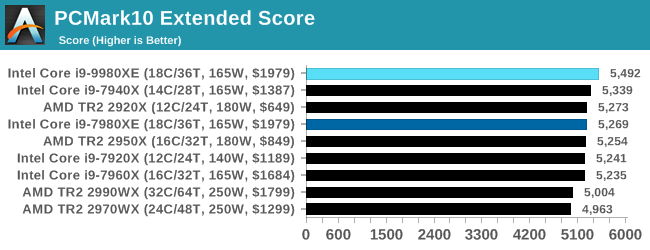
A small bump in the result here because of the added core frequency.
Chromium Compile: Windows VC++ Compile of Chrome 56
A large number of AnandTech readers are software engineers, looking at how the hardware they use performs. While compiling a Linux kernel is ‘standard’ for the reviewers who often compile, our test is a little more varied – we are using the windows instructions to compile Chrome, specifically a Chrome 56 build from March 2017, as that was when we built the test. Google quite handily gives instructions on how to compile with Windows, along with a 400k file download for the repo.
In our test, using Google’s instructions, we use the MSVC compiler and ninja developer tools to manage the compile. As you may expect, the benchmark is variably threaded, with a mix of DRAM requirements that benefit from faster caches. Data procured in our test is the time taken for the compile, which we convert into compiles per day.
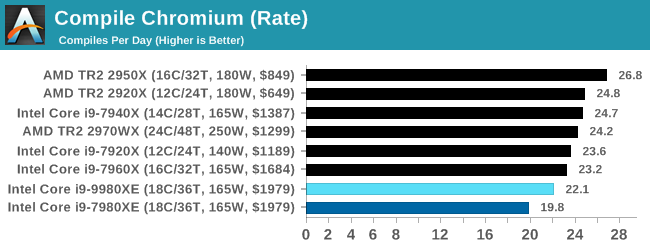
For the compile test, the 9980XE brings the 18-core up to being more competitive, however this test does seem to prefer fewer cores, lower crosstalk, and higher frequencies. AMD's 16-core TR2 wins here, adding 20% perf over the 9980XE for under half the cost.
3DMark Physics: In-Game Physics Compute
Alongside PCMark is 3DMark, Futuremark’s (UL’s) gaming test suite. Each gaming tests consists of one or two GPU heavy scenes, along with a physics test that is indicative of when the test was written and the platform it is aimed at. The main overriding tests, in order of complexity, are Ice Storm, Cloud Gate, Sky Diver, Fire Strike, and Time Spy.
Some of the subtests offer variants, such as Ice Storm Unlimited, which is aimed at mobile platforms with an off-screen rendering, or Fire Strike Ultra which is aimed at high-end 4K systems with lots of the added features turned on. Time Spy also currently has an AVX-512 mode (which we may be using in the future).
For our tests, we report in Bench the results from every physics test, but for the sake of the review we keep it to the most demanding of each scene: Cloud Gate, Sky Diver, Fire Strike Ultra, and Time Spy.
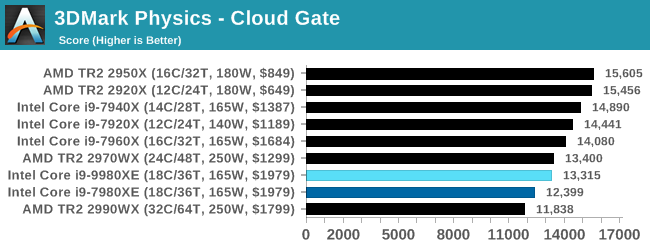
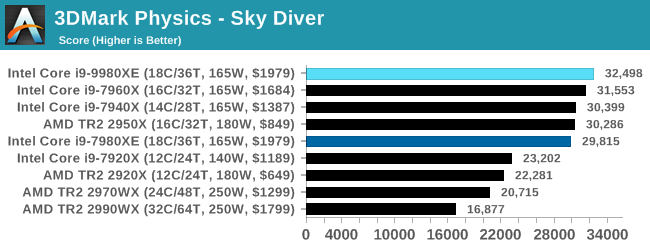
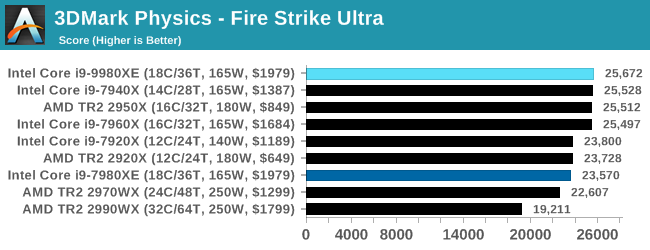
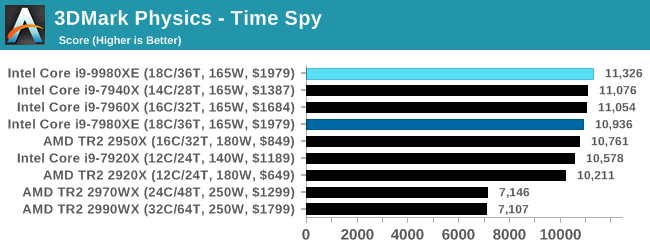
The newer engines can take advantage of the higher core count parts, and Intel's unified memory design also helps here.
GeekBench4: Synthetics
A common tool for cross-platform testing between mobile, PC, and Mac, GeekBench 4 is an ultimate exercise in synthetic testing across a range of algorithms looking for peak throughput. Tests include encryption, compression, fast Fourier transform, memory operations, n-body physics, matrix operations, histogram manipulation, and HTML parsing.
I’m including this test due to popular demand, although the results do come across as overly synthetic, and a lot of users often put a lot of weight behind the test due to the fact that it is compiled across different platforms (although with different compilers).
We record the main subtest scores (Crypto, Integer, Floating Point, Memory) in our benchmark database, but for the review we post the overall single and multi-threaded results.
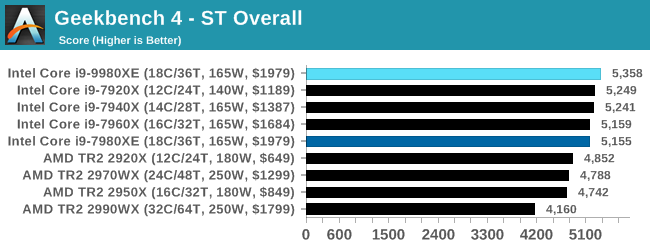
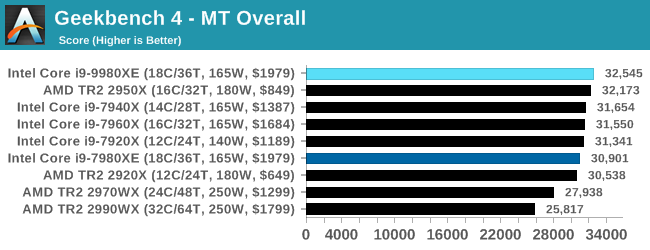










143 Comments
View All Comments
Stasinek - Wednesday, November 21, 2018 - link
It's indeed suprise to me that those new 24,32C AMD processors 2920,2970 are just worst in any therms than their 16C equivalents. In terms of perf/money perf/power just laughable.Linux changes a lot but who uses Linux and for what purpose?
I bet developers but what makes me really angry is that nobody even tries to use KVM, Xen, VirtualBox, VMware, VirtualBox as benchmarking tool for purpose of testing usage as small company server. In mine company lot of Remote Desktop sessions are connected to same server.
Someone would think - who needs good CPU? But it's only because dont used to solve real life problems and those problems are like importing big databases from obsolete programs, filtering, fixing and exporting to new ERP systems. This consumes lot of time to have fast CPU is crucial. Most of companies i know uses RDP server for that purpose and typical cheep portable laptops given to workers. To have AMD or Intel HDET tested in such purposes would be nice to see. Cause anyone can potencially have 32C anyone could benefit.. but rather than this kind test i used to see gaming.. gaming od HDET?! WTF
pandemonium - Wednesday, November 14, 2018 - link
All of these "my work doesn't have any desktop users" comments crack me up. Congratulations. Your work is not the entire world of computing in a professional space, much less prosumer space. Get over yourselves.halcyon - Wednesday, November 14, 2018 - link
@Ian CutressYour tests and review text are always a pleasure to read, thank you for the professionalism.
Questions related to the test suite (I know, everybody always wants something):
1. You are missing an Excel Spreadsheet calculation (Finance still uses a lot of these and they can peg all cores near 100% and be incredibly CPU dependent). Would be nice to see some for example an Excel Monte Carlo simulation kn the suite (local data)
2. Alternatively an R (language) based test for heavy statistical computation. Finding a one that is representative of real world workloads and strikes a balance between single core IPC and many core parallelisation might take some work. But this is one area where laptops just can't muster it and CUDA/OpenCL acceleration isn't often available at all.
3. For Web / JS framework it is nice to see SpeedoMeter and WebXPRT3, but for some reason V8 Web Tooling Bench is not there (https://v8.github.io/web-tooling-benchmark/ ). The old Kraken/JetStream/Octane are nice for reference, but not very representative of real world anymore for some time now (hence why they are abandoned).
Again thank you for this monumental work, the amount of tests is already superb!
For graphing results it would be so helpful to get a comparative price/perf graphed results browser (pick your baseline CPU, pick workloads, cpus on graph as a func of price/perf). This would enable auick viewinf of the efficient frontier in terms of price/perf for each workload and see the base CPU as an anchor.
Yeah, yeah, I know.... Just throwing this in here 😀
KAlmquist - Wednesday, November 14, 2018 - link
These benchmarks also show the 16 core TR 2950X beating the 18 core i9-9980XE in some cases.KAlmquist - Wednesday, November 14, 2018 - link
My previous comment was a reply to nexuspie's observation that, "These benchmarks show that the 9980's 18 cores often BEAT the 2990wx's 32 cores."Stasinek - Wednesday, November 21, 2018 - link
Witch should lead to conlcusion AMD Threadripper 2 is just bad offer except 2950.It's the one and only AMD CPU worh mentioning - witch means TR4 16C is dead end.
AMD offers overpriced CPUs on that platform that is for sure.
Overpriced because half of cores are choking being absolute useless.
If 32C and 4 channels is too much cores/channel imagine RYEN 3 16C on dual channel..
It will be big dissapointment for some people i bet.
Regardless of pricing Intel 9980 is just great.
Stasinek - Wednesday, November 21, 2018 - link
Is that what you wanted to say?crotach - Wednesday, November 14, 2018 - link
I have to say I'm a big fan of HEDT platforms, I built my last workstation in 2011 and it still serves me well 7 years later. But looking at this and the X299 offering I really don't see why anyone would bother.Lolimaster - Thursday, November 15, 2018 - link
Till intel changes the way it builds high core count cpu's they can't compete with AMD and it will be even worse next year when AMD made an already cheaper way to produce high core count cpu's even cheaper, to sick levels.Gasaraki88 - Thursday, November 15, 2018 - link
I'm actually more interested in the i7-9800X vs. the i9-9900K. I want to see how the overclocking is compared to the i9-9900K before I just in to X299.